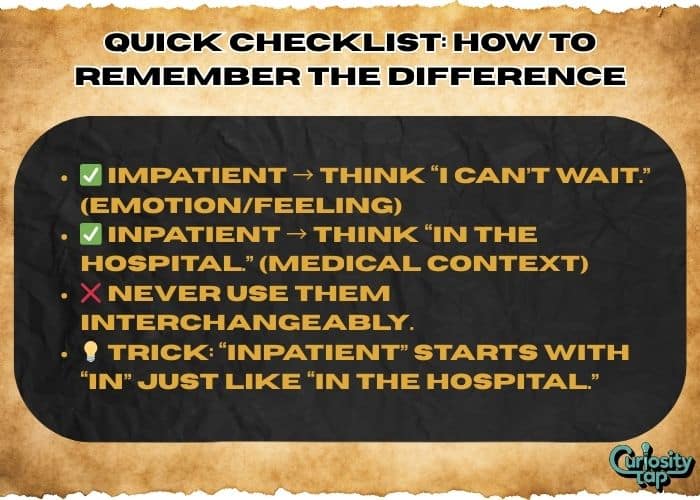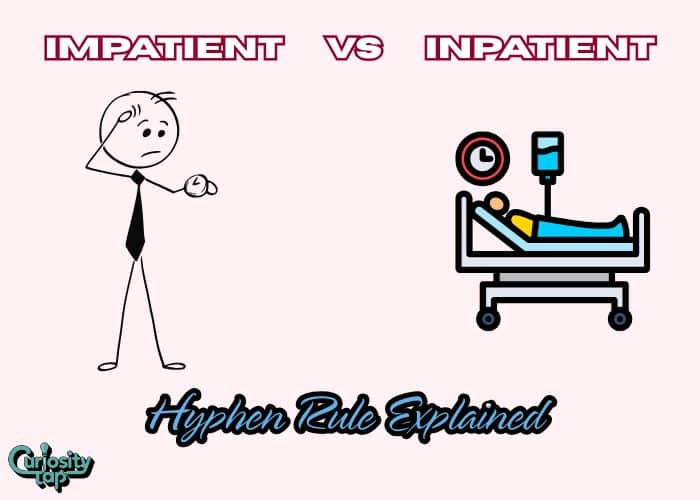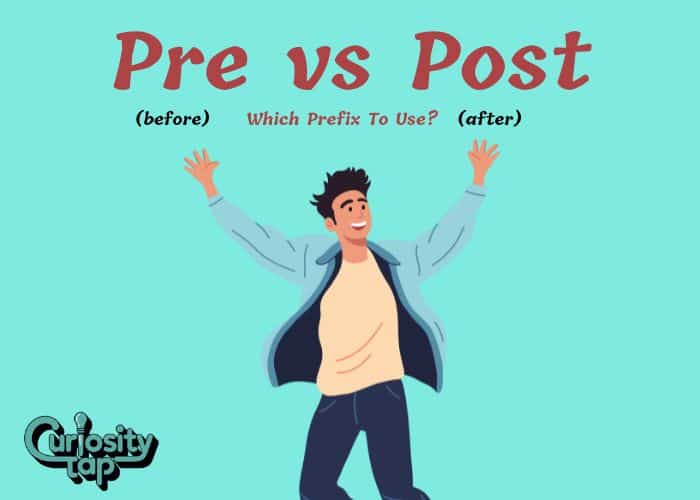Ever caught yourself hesitating while typing impatient or inpatient? You’re not alone. These two words look almost identical but have very different meanings and confusing them can change the entire context of your sentence.
This article clears the fog by explaining the difference with examples, usage tips, and real-life scenarios.
What Does Impatient Mean?
The word impatient describes a feeling of restlessness, frustration, or eagerness when waiting for something. It’s an adjective that highlights emotion or temperament.
Everyday Usage of “Impatient”
- “She grew impatient waiting in the long queue.”
- “He’s always impatient to see results quickly.”
Synonyms for “Impatient”
- Restless
- Anxious
- Irritable
- Eager
This word is commonly used in both casual and professional communication to describe mood or behavior.
What Does Inpatient Mean?
On the other hand, inpatient is a noun or adjective used primarily in healthcare. It refers to a patient admitted to a hospital for at least one overnight stay.
Everyday Usage of “Inpatient”
- “The hospital provides specialized care for inpatients.”
- “She was admitted as an inpatient for observation.”
Related Terms
- Outpatient: a patient who receives treatment without being admitted.
- Hospitalized: another way of describing someone as an inpatient.
Impatient vs Inpatient: The Core Difference
The confusion arises because of their similar spelling. But the distinction is clear:
| Word | Part of Speech | Meaning | Example Sentence |
|---|---|---|---|
| Impatient | Adjective | Restless, unable to wait calmly | “He was impatient during the delay.” |
| Inpatient | Noun/Adjective | Patient admitted to hospital | “The clinic offers inpatient services.” |
A Real-Life Example: Why the Difference Matters
Consider this scenario:
Jane, a content writer, once typed in a medical blog, “The doctor prescribed medication for his impatient treatment.” Readers were left scratching their heads why would a doctor treat someone’s restlessness with a hospital prescription? What she actually meant was inpatient.
This small slip caused confusion, and her editor had to clarify with readers. It’s a reminder of how a single misplaced letter can affect credibility, especially in academic, medical, or professional contexts.

Quick Checklist: How to Remember the Difference
- ✅ Impatient → Think “I can’t wait.” (Emotion/feeling)
- ✅ Inpatient → Think “In the hospital.” (Medical context)
- ❌ Never use them interchangeably.
- 💡 Trick: “Inpatient” starts with “in” just like “in the hospital.”
Why This Confusion Happens
Spelling Similarity
Both words share the “patient” root, making them visually tricky.
Different Domains of Use
- Impatient: General language, personality, or behavior.
- Inpatient: Strictly medical, healthcare settings.
Understanding the context of your sentence will help you choose correctly.
Pros & Cons of Each Word in Communication
Using “Impatient”
Pros
- Widely understood in daily conversations.
- Adds emotional depth to writing.
Cons
- Can sound negative if overused.
Using “Inpatient”
Pros
- Clear and precise in medical contexts.
- Avoids ambiguity when describing healthcare situations.
Cons
- Limited usage outside healthcare.
FAQs About Impatient vs Inpatient
Is “impatient” a negative word?
Not always. It can mean eager in a positive sense (“impatient to start a new job”) but often carries a negative tone if used about behavior.
Is “inpatient” only used in hospitals?
Mostly yes, though it can also refer to rehabilitation centers or psychiatric facilities where overnight admission is required.
Can someone be both inpatient and impatient?
Absolutely! A hospitalized person might feel impatient while waiting for discharge.
What’s the opposite of “impatient”?
The antonym is “patient,” meaning calm and tolerant.
What’s the difference between inpatient and outpatient?
An inpatient stays overnight for treatment, while an outpatient visits for care and leaves the same day.
Conclusion
The distinction between impatient and inpatient is more than a spelling quirk it changes meaning entirely. One deals with emotions, the other with healthcare. By remembering their usage and applying the quick checklist, you can avoid embarrassing mistakes and write with confidence.
Call to Action
Want to sharpen your English and write successfully every time?
Check out our Grammar Checker Tool and never second-guess your spelling again!
Read our guide on Common English Misspellings to boost your skills even further.
Sources List
Sources:
- Merriam-Webster Dictionary. (2024). Impatient and Inpatient. Retrieved from: https://www.merriam-webster.com
- Cambridge Dictionary. (2024). Impatient vs Inpatient. Retrieved from: https://dictionary.cambridge.org
- Centers for Medicare & Medicaid Services. (2023). Hospital inpatient services. Retrieved from: https://www.cms.gov
Read more knowledgeable blogs on Curiosity Tap
Is this article helpful?

Jackson Pearson is a passionate educator and language enthusiast behind the blog Jackson Pearson. With years of experience in teaching and writing, he specializes in simplifying complex grammar rules, breaking down tricky vocabulary, and crafting learning guides that are both engaging and practical. His mission is to help readers boost their English skills whether they’re beginners or brushing up for fluency. Through every article, Jackson brings clarity, structure, and a spark of curiosity to the world of English learning.



